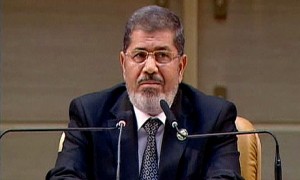 Egypt’s first democratically elected president, Mohammed Morsi, is due to stand trial alongside 14 other senior figures from the Muslim Brotherhood (MB) on 4 November. The Islamist president was ousted by the military in July in response to mass protests.
Egypt’s first democratically elected president, Mohammed Morsi, is due to stand trial alongside 14 other senior figures from the Muslim Brotherhood (MB) on 4 November. The Islamist president was ousted by the military in July in response to mass protests.
Here is a guide to some of the issues surrounding his trial:
What charges does Mohammed Morsi face?
The court trying Mr Morsi has not yet presented an indictment list against him or the other defendants. However, the state-run weekly magazine, Al-Ahram Al-Arabi, said the defendants were being charged with inciting pro-Morsi supporters to kill and torture protesters outside the presidential palace.
The other defendants include the former presidential and deputy presidential chief-of-staff, and senior Brotherhood leaders Mohammed al-Beltagiand Essam el-Erian, the recently-arrested deputy leader of the Brotherhood’s political wing, the Freedom and Justice Party.
Separately, Mr Morsi is facing an ongoing inquiry into his escape from jail during the 2011 uprising against Mr Mubarak and into claims that he conspired with the Palestinian militant group, Hamas, during the prison break.
What led up to Mr Morsi’s arrest?
In December 2012, the Islamist-dominated constituent assembly approved Mr Morsi’s draft constitution boosting the role of Islam and restricting freedom of speech and assembly. The public approved it in a referendum but this prompted widespread protests by secular opposition leaders, Christians and women’s groups.
Over 50 people were killed the following month in violent street protests.
In July, the military warned Mr Morsi that it would intervene if he did not reach an agreement within 48 hours with opposition groups to resolve Egypt’s political crisis.
On 3 July 2013, the head of the Egyptian army, General Abdul Fattah al-Sisi, announced the suspension of the constitution. The move followed four days of mass street protests calling for the resignation of Mr Morsi, who had not responded to the ultimatum. He was subsequently arrested.
During his 13-months in power Mr Morsi fell out with key institutions and sectors of society and was seen by many Egyptians as doing little to tackle economic and social problems.
He also faced accusations of working for the Muslim Brotherhood, rather than for the Egyptian people as a whole, and of seeking to change the character of the state in line with the Brotherhood’s Islamist ideology.
Egypt became polarised between his Islamist supporters and his opponents, who generally include liberals, secularists and leftists.
How significant is the trial?
Several of Egypt’s most influential figures approved the removal of Mr Morsi from power. They include religious figures such as Egypt’s highest Islamic authority, the Grand Sheikh of al-Azhar, and the head of the Christian Coptic Church, as well as political heavyweights like the liberal politician and former chief of the International Atomic Energy Agency, Mohamed ElBaradei, and the conservative Salafist Nour party.
But debates about the legality of ousting a democratically-elected leader have dominated Egyptian discourse and anti-Morsi protestors have frequently clashed with his supporters on the streets.
Only days before Mr Morsi’s trial, three presiding judges stepped down at the trial of Muslim Brotherhood leader Mohammed Badie and his two aides. Judge Mohammed Fahmy al-Qarmuty said he and his colleagues had a “feeling of embarrassment” over the case.
With Mr Morsi in court, Egypt will have two former presidents on trial simultaneously. Hosni Mubarak, who was toppled in 2011, is being retried on charges that he too was complicit in the killings of protesters against his rule.
Legal experts say that under Egyptian law, if convicted, Mr Morsi could be jailed for life or face the death penalty.
A spokesman for Mr Morsi’s legal team says he has not appointed anyone to defend him in court as he still considers himself to be Egypt’s legitimate president.
Where will the trial be held?
Media reports say the trial could be held at the Police Academy in eastern Cairo, where Mr Mubarak is being tried, or at the non-commissioned police officers’ institute in Tora, south of Cairo. But there has been no official confirmation yet. Most of the Brotherhood leaders are being held at Tora Prison, while Mr Morsi himself has been detained at a secret location since July.
The likelihood of televising the proceedings has also not been confirmed. The Tamarod Movement, an anti-Morsi youth group, has called for live broadcasts to ensure that the proceedings are transparent and fair. Morsi supporters are also in favour of live broadcasts as they believe that TV images showing him behind bars could provoke sympathy for him.
Is there likely to be violence?
There are legitimate concerns that the trial could increase tensions between the Brotherhood and the military and destabilise the country even more.
The National Alliance for Supporting Legitimacy, which includes Brotherhood supporters, has called for mass rallies on 4 November to protest against the trial. The Brotherhood is also said to be mobilising its forces ahead of the trial.
The military-backed government has in place a tight security plan to ensure that the trial goes smoothly. Interior Ministry officials told the media that Mr Morsi is to be shuttled by helicopter to the court and that up to 20,000 policemen will be deployed. But there is still speculation that Mr Morsi may not even appear in person.
BBC

Leave a Reply
You must be logged in to post a comment.